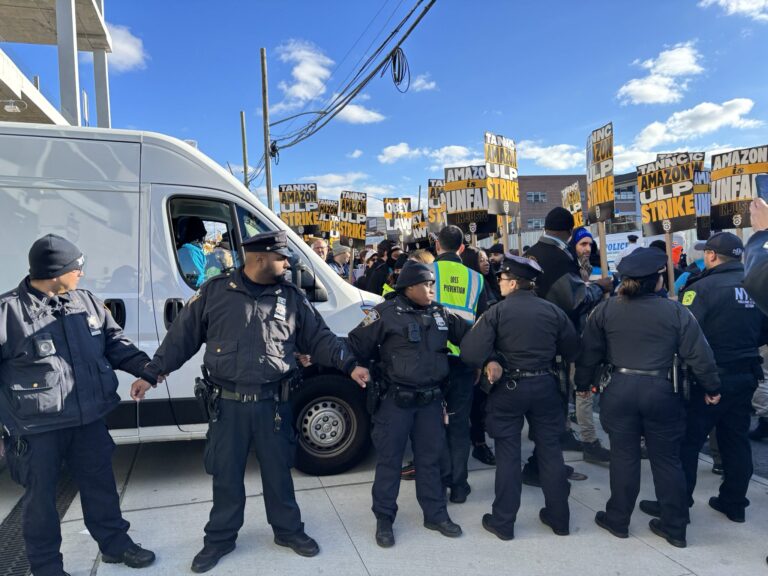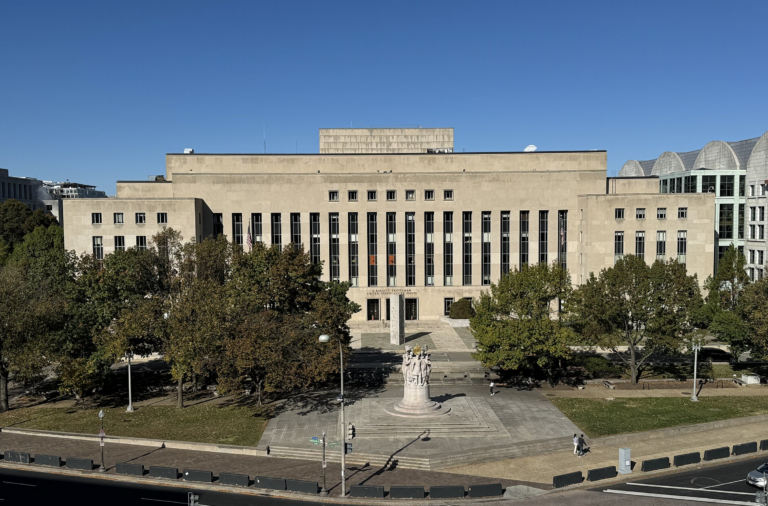Melody Burke is a student at Harvard Law School and a member of the Labor and Employment Lab.
On March 30, 2020, after complaining to management about the lack of personal protective equipment and distancing measures designed to ensure health and safety, an Amazon worker named Christian Smalls organized a warehouse-worker walkout to protest unsafe working conditions relating to the pandemic. That same day, he was fired.
Throughout the pandemic, whistleblowers like Christian Smalls have faced retaliatory action for reporting a lack of adequate health and safety measures to protect workers from the COVID-19 virus in their workplaces. In August 2020, a federal government report observed that whistleblower claims relating to workplace safety increased exponentially during the pandemic, and that trend has continued. Although examples are too numerous to report here, other cases include an employee alleging that his employer, a New Jersey pizzeria, retaliated against him for requesting to be quarantined when other employees exhibited symptoms and/or tested positive for the virus and an employee at a truck manufacturing facility getting fired for publicly expressing concerns about workplace safety. More recently, in October 2021, the Department of Labor sued Hi Tech Motorcars LLC, a luxury car dealer, for firing an employee who sent a company-wide email about a colleague that had tested positive for COVID-19 after management refused to notify other employees immediately of their exposure.
Whistleblowers are usually protected from retaliation and termination under state and federal legislation. These statutes typically provide that workers who report illegal activities relating to workplace safety and health are protected from adverse action from their employers, such as retaliation or termination. The scope of these protections varies by jurisdiction, including by the type of worker (sometimes protections are limited to current employees, sometimes they extend to independent contractors or former workers), the method of reporting, and the type of underlying activity that is whisteblown, such as actual versus suspected legal activities, or violations that pose “significant” danger.
In terms of occupational health and safety protections for whistleblowers, the federal regime is the most comprehensive. In addition to enforcing Section 11(c) of the federal Occupational Safety and Health Act relating to antiretaliation, the Occupational Safety and Health Administration’s (OSHA) Whistleblower Protection Program enforces the antiretaliation provisions found in over 20 federal statutes protecting whistleblowers from adverse action for reporting violations of workplace safety and health. According to OSHA, an “adverse action is an action which would dissuade a reasonable employee from raising a concern about a possible violation or engaging in other related protected activity.” In terms of reporting issues that impact employee safety, OSHA’s program covers current and former employees in the private sector in businesses affecting interstate commerce as well as current and former employees of the U.S. Postal Service. These employees have the right, among other things, to file complaints relating to the Act and to exercise the rights afforded by the Act, which include communicating with management about occupational health and safety matters (such as asking questions or expressing concerns), reporting a work-related injury or illness, or refusing to work where there is “a real danger of death or serious physical harm, there is insufficient time to have OSHA or a state OSHA inspect and, where possible, the employee has sought from the employer and been unable to obtain correction of the dangerous condition.”
In September 2021, OSHA released an informational fact sheet highlighting the application of OSHA programs, policies, and standards in relation to COVID-19 whistleblower complaints. This fact sheet details pandemic-related activities protected under the Act such as requesting and wearing personal protective equipment, reporting infections or exposures, and requesting guidance on workplace safety from an employer, OSHA, or another government entity. It also outlines the process for filing retaliation complaints, after which OSHA will review the complaint, determine whether an investigation is appropriate, and if an investigation supports an employee’s claim of retaliation and a voluntary settlement cannot be reached with the employer, the Secretary of Labor may litigate the case.
Several states have enacted new statutes protecting whistleblowers reporting about occupational health and safety since the start of the pandemic (such as Virginia and Colorado) or expanded existing ones. Other states have issued interpretive guidance regarding the existing law protecting employees who report unsafe working conditions in relation to the pandemic.
The most recent addition to these legislative efforts to protect whistleblowers complaining about occupational health and safety is New York’s expansion of the state’s Labor Law Section 740, which came into effect on January 26, 2022. This is not New York’s first expansion of whistleblower protections during the pandemic. In June 2020, New York expanded protections for healthcare whistleblowers, allowing employees to report any “improper quality of workplace safety” where the violation would relate “to matters which may present a substantial and specific danger to public health or safety or a significant threat to the health of a specific patient.” Previously, the law prohibited retaliation against whistleblowers in the healthcare field only if the activity affected patients or the general public; the 2020 amendments expanded the law to include healthcare employees who report unsafe conditions for employees as well. It also protected healthcare employees from retaliation for reporting to the press or on social media.
The newest amendments provide broader protections. The June 2020 amendments were directed specifically at healthcare employees in response to issues they were facing in the early stages of the pandemic, whereas the new amendments that came into effect last week reflect a wider expansion of whistleblower protections meant to encompass a greater variety of workplaces and whistleblowers.
The new amendments expand the scope of protection by:
- Broadening the categories of workers protected from retaliatory action. The law used to include only current employees; now it includes independent contractors and former employees.
- Expanding the scope of protected activity. Prior to these amendments, the protected activity covered needed to be an actual violation of the law, whereas the new law — as observed in the National Law Review — will protect those who “disclose or threaten to disclose to a supervisor or to a public body an activity, policy or practice of the employer that the employee reasonably believes is in violation of law, rule or regulation or that the employee reasonably believes poses a substantial and specific danger to the public health or safety.” This shift to “reasonable belief” arguably “opens the door for employees to blow the whistle on employer activities, policies, or practices that violate a wider range of laws, rules and regulations that go beyond public safety.”
- Lengthening the statute of limitations for bringing an action against and employer. Now a whistleblower has two years to bring an action, rather than just one year.
- Loosening disclosure requirements. Another major change under the amendments are the disclosure requirements. Instead of having to disclose violations to their employers first (as was previously the law), workers need to make only a “good faith” effort to inform their employers before reporting the violation to a regulatory authority or public body. There are also exceptions in the case of imminent danger, if the worker believes the employer would destroy evidence or conceal the violation, or if the worker reasonably believes that the supervisor is aware of the violation and simply refuses to correct it.
There have also been recent judicial developments that have strengthened protections for whistleblowers. On January 27, 2022, the Supreme Court of California clarified the standard of proof for retaliation claims brought under the state’s Labor Code: employers have to prove by clear and convincing evidence that the plaintiff would have faced the allegedly retaliatory consequence (such as being fired) even if they had not reported any wrongdoing.
Nearing the two-year mark of this pandemic, the whistleblower legal landscape — particularly in New York State — has clearly changed dramatically and all stakeholders will need to stay appraised of these developments.










Daily News & Commentary
Start your day with our roundup of the latest labor developments. See all
January 26
Unions mourn Alex Pretti, EEOC concentrates power, courts decide reach of EFAA.
January 25
Uber and Lyft face class actions against “women preference” matching, Virginia home healthcare workers push for a collective bargaining bill, and the NLRB launches a new intake protocol.
January 22
Hyundai’s labor union warns against the introduction of humanoid robots; Oregon and California trades unions take different paths to advocate for union jobs.
January 20
In today’s news and commentary, SEIU advocates for a wealth tax, the DOL gets a budget increase, and the NLRB struggles with its workforce. The SEIU United Healthcare Workers West is advancing a California ballot initiative to impose a one-time 5% tax on personal wealth above $1 billion, aiming to raise funds for the state’s […]
January 19
Department of Education pauses wage garnishment; Valero Energy announces layoffs; Labor Department wins back wages for healthcare workers.
January 18
Met Museum workers unionize; a new report reveals a $0.76 average tip for gig workers in NYC; and U.S. workers receive the smallest share of capital since 1947.